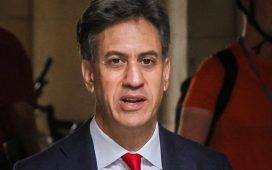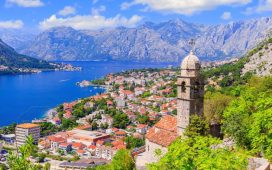Iran has seized two foreign tankers, including a UK-flagged ship, in the Strait of Hormuz in a sharp escalation of the crisis between the Islamic republic and the west.
Iran’s Revolutionary Guards said the British-registered Stena Impero had been “seized by Zone 1 of the guards’ naval forces” as it moved through the key Gulf waterway. The elite force added that the tanker “failed to observe the international maritime rules and regulations”.
The vessel’s owner, Stena Bulk, said the tanker was approached by “unidentified small crafts and a helicopter” as it was in the Strait of Hormuz en route to Saudi Arabia. The Swedish company said it was unable to contact the ship, which has a crew of 23.
British officials said a Liberian-flagged tanker had also been apprehended in the Gulf.
Jeremy Hunt, the UK foreign secretary, said he was “extremely concerned by the seizure of two . . . vessels by Iranian authorities”.
“These seizures are unacceptable. It is essential that freedom of navigation is maintained and that all ships can move safely and freely in the region,” Mr Hunt said. “Their crews comprise a range of nationalities, but we understand there are no British citizens on board either ship.”
The second vessel was not named but US officials and various ship-tracking sites suggested it was the Liberian-flagged Mesdar, a 2m-barrel capacity very large crude carrier.
Iranian news agencies said the second tanker was stopped and then released.
The seizures come 24 hours after the US claimed to have shot down an Iranian drone that it said ventured too close to an American warship in the Strait. Tehran has denied it lost a drone, but it is a sign of how the heightened tensions threaten to escalate into military conflict.
Tehran has repeatedly threatened to retaliate for the UK’s decision to seize an Iranian tanker suspected of smuggling oil to Syria in violation of EU sanctions this month.
The UK government’s Cobra emergency response committee was convened on Friday evening to discuss London’s response. Britain is only days away from having a new prime minister, with Theresa May due to step down when the Conservative party announces a new leader on Tuesday.
The White House said it was aware of the reports that Iranian forces had seized a British tanker.
“This is the second time in just over a week the UK has been the target of escalatory violence by the Iranian regime,” said Garrett Marquis, the National Security Council spokesperson. “The US will continue to work with our allies and partners to defend our security and interests against Iran’s malign behaviour.”
Speaking before he boarded his Marine One helicopter on Friday afternoon, President Donald Trump said he was “going to be speaking to the UK” about the seizures of the ships. He said Iran was “trouble, nothing but trouble”.
Last week, a Royal Navy frigate intervened to prevent Iranian forces impeding the passage of a tanker owned by UK energy group BP as it moved through the Gulf.
Iran dismissed the claims that it had sought to disrupt the tanker’s passage. But as tensions between the US and the Islamic republic have escalated, Washington and London have blamed Iran for sabotage attacks on six tankers off the coast of the United Arab Emirates in May and June.
Last month, Mr Trump aborted strikes on Iran 10 minutes before they were to be launched after Iranian forces downed an unmanned American spy drone.
Ship tracking data showed the Stena Impero to be sailing towards the Jubail refinery in Saudi Arabia on Friday, where it was expected to load petrochemical products on July 21.
The vessel then made an abrupt turn after 3pm UK time moving towards the port of Bandar Abbas in Iran, energy data company Kpler said. The vessel has not been submitting a signal for more than two hours. Kpler said it expected “the Stena Impero to remain dark as she approaches the Iranian coastline as the Iranian forces will most likely try to mask her final destination”.
The Revolutionary Guards said the Stena Impero had been handed over to Iran’s state-run Ports and Maritime Organisation.
Brent crude, the international oil benchmark, rose 1 per cent in late London trading to $62.48 a barrel.
The tanker’s seizure puts the UK and Iran on collision course at a time when Britain has been working with other European countries to de-escalate tensions.
The crisis in the Gulf was triggered by Mr Trump’s decision to unilaterally withdraw the US from the 2015 nuclear accord Iran signed with world powers. Crippling US sanctions have pushed Iran into a deep recession and thwarted its ability to export oil — the republic’s economic lifeline.
Iranian officials have warned that if the republic is not able to export its crude it will disrupt oil and petrochemical traffic through the Strait of Hormuz — through which about a third of seaborne oil travels
In May, Washington dispatched an aircraft carrier strike group to the Gulf citing unspecified “escalatory” activity by Iran. In the weeks since, there have been a number of incidents in the region amid warnings that the increased tensions could lead to a “miscalculation” sparking a wider conflagration.
The UK has not supported the US decision to pull out of the nuclear accord and impose sanctions Iran. It has been working with France and Germany, the other European signatories to the nuclear deal, to save the deal and help Iran counter the economic impact of Washington’s punitive measures.
But the UK’s role has been complicated by its decision to apprehend the Iranian tanker off the coast of Gibraltar this month. British officials insisted they had no choice because the vessel was in European waters and suspected of violating the EU sanctions.
The UK’s Royal Navy has one warship, HMS Montrose, a frigate, in the Gulf as well as four minesweepers operating in the area. A second Royal Navy ship, HMS Duncan, has also been sent to the Gulf to offer additional protection to UK shipping interests.
Reporting by Najmeh Bozorgmehr in Tehran, Demetri Sevastopulo in Washington, and Andrew England, David Bond, Jim Pickard and Anjli Raval in London













